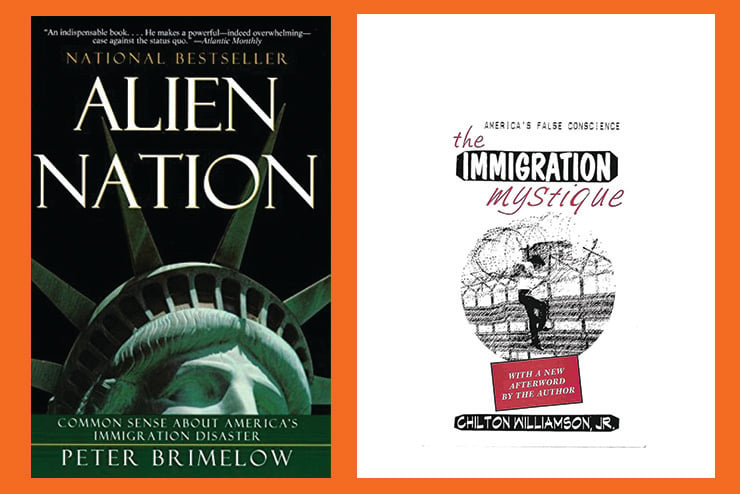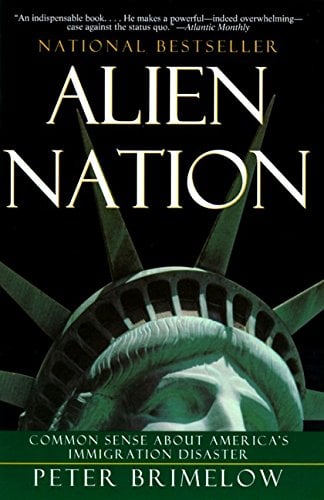Peter Brimelow’s Alien Nation, at the time of its publication, was the most comprehensive look at the turn America took on immigration in 1965. That was the moment when the increasingly extremist anti-discrimination ideology of the civil rights movement inserted itself into immigration law and policy, and transformed the country.
Thirty years on, the fourth through sixth chapters of the book are still a relevant, pointed, and profound introduction to the causes and the inevitable consequences of America’s shift in immigration policy. These three chapters are titled, respectively, “How Did It Happen?,” “Why Did It Happen?,” and “So What?” They consist of around 50 pages of brutal truth about how immigration policy was hijacked by radicals who desired to pull up the cultural roots of America, with the trusting cooperation of gullible centrists and conservatives, and why there is so little reason to believe that the consequences of that immigration revolution will turn out well.
The last of those three chapters bluntly asks the simple but essential question that has now been entirely cleansed from mainstream debate: Do multicultural, multiracial, multiethnic societies work? It is not bigoted to ask the question and examine the evidence, especially in the context of a cultural political movement that is furiously magnifying all those aspects of difference, on the unargued premise that this can only produce positive outcomes.
How the ratchet has tightened in the three decades since Alien Nation was written! At its publication, Brimelow was still a journalistic voice with access to mainstream media, even if his argument was vehemently contested and rejected by the liberal and leftist consensus that dominated those outlets. Now, he has been transformed into a Great Satan to be shunned, whose efforts to communicate in the public sphere must be shut down by police force, and whose livelihood must be destroyed by legal and juridical power. The tenor of what he argues has not much altered in those years. What has changed is the culture around him, in precisely the ways he predicted it would.
The afterword in the 1996 paperback edition is particularly insightful. It consists largely of Brimelow’s account of the dismal reception the book received in so-called intellectual circles. It is instructive to see just how intolerant the left-leaning elite culture was even three decades ago, and one can use this as a comparative gauge regarding how much further we have descended into the pit of radical orthodoxy.
—Alexander Riley

The 1980s were a heady time to be a “conservative.” More Americans identified with that term then than the “liberal” label. The decade was an ongoing celebration, especially on the pages of Ronald Reagan’s favorite publication, National Review. In that magazine’s back pages, Chilton Williamson Jr.’s “Right Books” column struck a disconcerting chord. No, it’s not a Golden Age, he would often write, we’re being invaded from below. In 1990, Williamson left NR for the sympathetic pastures at Chronicles, where he served as books editor and eventually as editor. By 1996, Williamson’s scholarship on immigration came to fruition in his compact but thorough book The Immigration Mystique.
This volume is the finest history of American immigration to date. It tells also the story of America’s descent from a self-governing people to a welfare state with denizens entertained into docility.
Immigration has never been popular. In the 1856 election, the anti-immigration American Party headed by former President Millard Fillmore received 25 percent of the vote. The coming decades saw literacy and health testing imposed as requirements for entry and the passing of the Asian Exclusion Acts. In 1920, the Republican Party ticket of Warren Harding and Calvin Coolidge was all-in on an immigration moratorium. In the Immigration Act of 1924 bill, the victorious GOP gave the public the time-out it craved. In 1952, Congress passed the McCarren-Walter Act, which tailored immigration policy to keep America’s European demographics intact, overriding President Truman’s angry veto.
President John F. Kennedy had badly wanted to overturn the 1924 bill. In the wake of his assassination, the 1965 immigration bill swept through Congress without much debate or opposition. Lawmakers assured Americans that the population makeup wouldn’t change, workers would not be threatened, that America would remain as it was. In fact, 85 percent of legal immigration would come from Asia and Latin America, and over a few short decades American demographics changed radically, with citizens of European descent declining to 60 percent from more than 90 percent before 1965.
The Immigration Mystique has never been timelier. “Mass deportation now!” read the banners at the last GOP convention, held aloft by desperate people who know that only the departure of tens of millions can save what’s left of America. Millions more now care about the issue than they did in 1996. Is it enough? Informative, scholarly, and fearless, Williamson’s book remains an unforgettable read.
—Joseph Scotchie


Leave a Reply